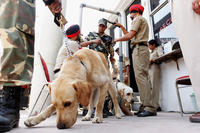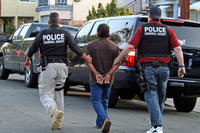-
Highly-trained Indian K-9s join counterterror forces

The Indo-Tibetan Border Police (ITBP) has a highly-trained unit in its force unlike any other in the world; police handlers have taught six Labradors to carry explosives in their teeth, sneak into terrorist lairs, plant remote-controlled bombs, hide secret cameras, interpret body language, and understand English and Hindi
-
-
Local police not required to detain illegals for ICE

Internal DHS documents reveal local law enforcement agencies are not required to hold undocumented immigrants when requested by the federal government; a coalition of groups against the controversial Secure Communities program obtained a total of three documents under a Freedom of Information request that clarified the policy of detainers for local law enforcement agencies
-
-
Detroit police push for ShotSpotter
Detroit police chief Ralph Godbee is pushing the city to purchase a $2.6 million automated gun-shot detecting system that he believes will help reduce violent crime; last summer, Detroit was hit by one of its most violent periods in recent history with 254 shootings that left fifty-two people dead in two months
-
-
Rumor of war: Is Israel about to attack Iran?
There is an increasingly heated debate in Israel, accompanied by leaks from high ups in the government, about a coming Israeli military attack on Iran; four developments have created a climate more hospitable to an Israeli military action: the progress Iran has made in its effort to build nuclear weapons — and the exposure of this progress in an IAEA report due out this week; changes at the top of the Israeli national security establishment — changes which saw individuals more favorable to an attack on Iran replace individuals who were adamantly opposed to military action; growing understanding between Israel, Saudi Arabia, and Jordan; and the coming elections in the United States; these developments have convinced Prime Minister Benjamin Netanyahu and Defense minister Ehud Barak — both proponents of an attack on Iran’s nuclear facilities — that a window has been opened for an Israeli military action against Iran
-
-
New York police officers equipped and ready to detect dirty bombs
Law enforcement officials operating in the New York City region are trained and equipped to intercept dirty bomb threats
-
-
China and Russia using cyberspies to steal U.S. secrets
A new Congressional report concludes that Chinese and Russian hackers backed by their respective states are stealing U.S. trade and technology secrets to boost their economic development; the report, titled “Foreign Spies Stealing U.S. Economic Secrets in Cyberspace” and written by the Office of the National Counterintelligence Executive, found that foreign hackers can easily gather large quantities of sensitive data without being detected because so much of it is stored on computers
-
-
EU and U.S. hold joint cybersecurity drill
On Thursday, the United States and the European Union held their first joint cybersecurity exercise in Brussels, Belgium; the exercise, dubbed “Cyber Atlantic 2011,” was aimed at strengthening efforts to protect international critical infrastructures
-
-
Mexican senators to discuss immigration law with Georgia lawmakers
In an effort to curtail the passage of harsh state immigration laws, a group of Mexican senators announced on Tuesday their plans to meet with lawmakers from several states including Georgia, Alabama, and Arizona; the senators hope to convince state lawmakers that illegal immigrants are generally law-abiding individuals who contribute to the U.S. economy
-
-
Cyberterrorism - The weapon of choice a decade after 9/11
Scott Schober, the president and CEO of Berkeley Varitronics Systems, warns of the growing threat from cyberterrorists; he writes that in ten years, “the terrorists’ weapon of choice may not necessarily be a 187,000 pound 767 jet loaded with fuel targeting” New York’s skyline, instead it will be pajama-clad hackers taking down an electrical grid, causing mass confusion in the aviation system, or targeting a nuclear power plant’s SCADA control system to create mass panic and chaos for millions
-
-
Texas county police buys drone that can carry weapons

The police in Montgomery County — and area north of Houston, Texas — is the first local police in the United States to deploy a drone that can carry weapons; the police says it will be used in chases of escaping criminals and tracking drug shipments
-
-
"The Dragon" makes life difficult for first responders
For emergency personnel in Tennessee, responding to calls on “The Dragon,” an unforgiving 11.1 mile stretch of highway, is no easy task; the Dragon consists of 318 sharp curves through hilly terrain making it treacherous for drivers and a nightmare for first responders; each year there are several fatal crashes and since 2005 the desolate road has been the scene of at least forty injury crashes a year
-
-
Push for military tribunals for terrorists
Republican lawmakers in Congress are pushing to include a provision in the 2012 military authorization bill which would require that terrorists who are not U.S. citizens who are caught plotting against the United States, would be in military custody and face military tribunals, even if they are caught in the United States. The Obama administration opposes such a requirement.
-
-
Anwar al-Awlaki and the 9/11 plotters
Representative Peter king (R-New York) wrote to Lt. Gen. Ronald Burgess, director of the Defense Intelligence Agency (DIA), to inquire whether 9/11-related detainees being held by the United States are been interrogated about the possible role U.S.-born cleric Anwar al-Awalki, who was killed by a U.S. drone on 30 September, played in the 9/11 attacks.
-
-
U.S. expands drone war to Horn of Africa
Representative Peter king (R-New York) wrote to Lt. Gen. Ronald Burgess, director of the Defense Intelligence Agency (DIA), to inquire whether 9/11-related detainees being held by the United States are been interrogated about the possible role U.S.-born cleric Anwar al-Awalki, who was killed by a U.S. drone on 30 September, played in the 9/11 attacks.
-
-
Dallas County homeland security director fired
Last week, in a sudden announcement, Dallas County’s homeland security director Lisa Chambers was fired; Chambers believes the decision may have been political, pointing to her refusal to conduct a sweep of Dapheny Fain’s home for surveillance devices following an FBI raid in June
-
More headlines
The long view
Factories First: Winning the Drone War Before It Starts
Wars are won by factories before they are won on the battlefield,Martin C. Feldmann writes, noting that the United States lacks the manufacturing depth for the coming drone age. Rectifying this situation “will take far more than procurement tweaks,” Feldmann writes. “It demands a national-level, wartime-scale industrial mobilization.”
No Nation Is an Island: The Dangers of Modern U.S. Isolationism
The resurgence of isolationist sentiment in American politics is understandable but misguided. While the desire to refocus on domestic renewal is justified, retreating from the world will not bring the security, prosperity, or sovereignty that its proponents promise. On the contrary, it invites instability, diminishes U.S. influence, and erodes the democratic order the U.S. helped forge.
Fragmented by Design: USAID’s Dismantling and the Future of American Foreign Aid
The Trump administration launched an aggressive restructuring of U.S. foreign aid, effectively dismantling the United States Agency for International Development (USAID). The humanitarian and geopolitical fallout of the demise of USAID includes shuttered clinics, destroyed food aid, and China’s growing influence in the global south. This new era of American soft power will determine how, and whether, the U.S. continues to lead in global development.
Water Wars: A Historic Agreement Between Mexico and US Is Ramping Up Border Tension
As climate change drives rising temperatures and changes in rainfall, Mexico and the US are in the middle of a conflict over water, putting an additional strain on their relationship. Partly due to constant droughts, Mexico has struggled to maintain its water deliveries for much of the last 25 years, deliveries to which it is obligated by a 1944 water-sharing agreement between the two countries.
How Disastrous Was the Trump-Putin Meeting?
In Alaska, Trump got played by Putin. Therefore, Steven Pifer writes, the European leaders and Zelensky have to “diplomatically offer suggestions to walk Trump back from a position that he does not appear to understand would be bad for Ukraine, bad for Europe, and bad for American interests. And they have to do so without setting off an explosion that could disrupt U.S.-Ukrainian and U.S.-European relations—all to the delight of Putin and the Kremlin.”
How Male Grievance Fuels Radicalization and Extremist Violence
Social extremism is evolving in reach and form. While traditional racial supremacy ideologies remain, contemporary movements are now often fueled by something more personal and emotionally resonant: male grievance.
